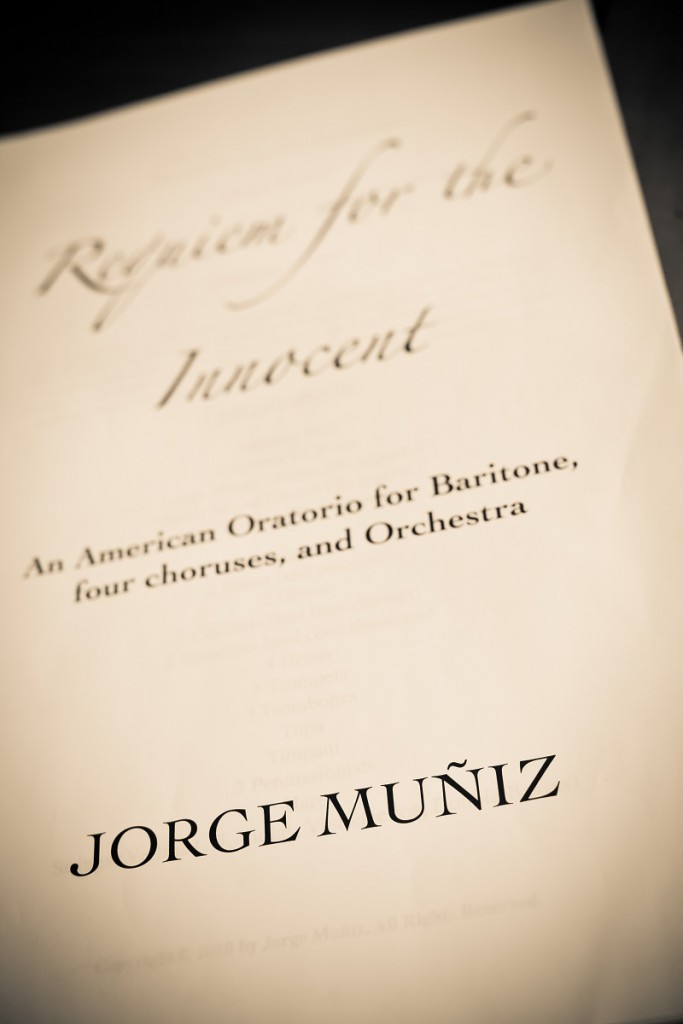Requiem for the Innocent (2010)
for Baritone, Four Choruses, and Orchestra
 Terrorism is one of the most concerning problems of our society today. As a Spaniard, I lived through many years of fear and experienced the horror and cruelty of the attacks of ETA, the Basque terrorist group. The second movement of my Concerto for English Horn is dedicated to the memory of Miguel Ángel Blanco, a Spanish politician assassinated after ETA kidnapped and sentenced him to death unless the Spanish government released several convicted terrorists. For forty-eight hours, the entire country stood in front of the television and the radio hoping for a clemency that never came. While I was studying for my doctorate at the Manhattan School of Music in New York City, I was direct witness of the terrorist attacks on September 11, 2001. During the days that came after that darkest hour, I experienced something that I never felt so strongly before: I was a New Yorker and an American as much as everybody around me. The sense of unity that I felt those days in New York, and the defense of our pillar values not only as part of Western civilization – past and present, but also as part of Humanity, has never left me since then. Later terrorist attacks in Madrid on March 11, 2004, and more recent bombings in the Madrid airport have firmly convinced me that this unity regarding common human values is a necessity.
Terrorism is one of the most concerning problems of our society today. As a Spaniard, I lived through many years of fear and experienced the horror and cruelty of the attacks of ETA, the Basque terrorist group. The second movement of my Concerto for English Horn is dedicated to the memory of Miguel Ángel Blanco, a Spanish politician assassinated after ETA kidnapped and sentenced him to death unless the Spanish government released several convicted terrorists. For forty-eight hours, the entire country stood in front of the television and the radio hoping for a clemency that never came. While I was studying for my doctorate at the Manhattan School of Music in New York City, I was direct witness of the terrorist attacks on September 11, 2001. During the days that came after that darkest hour, I experienced something that I never felt so strongly before: I was a New Yorker and an American as much as everybody around me. The sense of unity that I felt those days in New York, and the defense of our pillar values not only as part of Western civilization – past and present, but also as part of Humanity, has never left me since then. Later terrorist attacks in Madrid on March 11, 2004, and more recent bombings in the Madrid airport have firmly convinced me that this unity regarding common human values is a necessity.
Requiem for the Innocent is a work that will attempt to fulfill this longing for concord and peace, as a prayer for the souls of the departed, the victims of terrorism. Unlike other works of remembrance, it does not intend to bring images and emotions from the tragic events that terrorism has brought to us in the recent decades. Instead this work is about belief, a common quality of mankind throughout history. It is a prayer of our society for the salvation and eternal rest of all the victims of terrorist acts in the recent years.
The composition is scored for baritone, two mixed choruses, a male chorus, a children’s chorus, and orchestra. The largest monotheistic religions (past and present) are represented in this work by the choices of texts from these traditions. The main sections in the work are not organized around the movements of the Catholic requiem, but around the following concepts: Prayer for eternal rest, Acknowledgement of our own sins, prayer for absolution, The souls awaiting for final judgment and the need for purification, and a Celebration of life, the vision of paradise, and the light of salvation.
The work has seven movements:
1. Tehillim 23 – Introit (Hebrew and Latin)
2. Lord Have Mercy (Greek, Arabic, Hebrew, and English)
3. Sequence (Latin, Arabic, and English)
4. Holy (Hebrew, Latin, and Arabic)
5. Agnus Dei – Libera me (Latin)
6. In Communion (Hebrew, Spanish, and Arabic)
7. In Paradisum (Latin, Arabic, and English).
The composition of this work was partially supported by Indiana University’s New Frontiers in the Arts & Humanities Program, funded by the Office of the President and administered by the Office of the Vice Provost for Research, a faculty research grant by the Office of the Executive Vice Chancellor of Academic Affairs, Indiana University South Bend, and the South Bend Symphony Orchestra.
Reviews of Requiem for the Innocent
"Muñiz has written a magnificent requiem... An undertaking as ambitious as “Requiem for the Innocent” could come off pretentious, naive or unwieldy. Instead, Muñiz has a creation that is profound, mature and well-proportioned. Ideally, other orchestras will program the piece, because it should certainly be heard again. Maybe Muñiz can get it recorded for CD. If so, perhaps he could even add a few minutes of music. At an hour, it felt a little too short.” - Jack Walton, South Bend Tribune, October 5, 2010